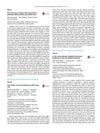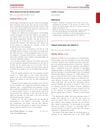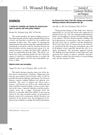 July 2023 in “British journal of dermatology/British journal of dermatology, Supplement”
July 2023 in “British journal of dermatology/British journal of dermatology, Supplement” Aging changes scalp cells, possibly affecting hair health in older women.
 June 2023 in “Journal of cosmetic dermatology”
June 2023 in “Journal of cosmetic dermatology” Dermatologists should know hair prosthetic options to better help alopecia patients.
 June 2023 in “Yaghag hoeji”
June 2023 in “Yaghag hoeji” Umbraulva japonica extract may help treat hair loss by promoting hair growth phase.
April 2023 in “CRC Press eBooks” Hair care products mainly work on the hair's surface and need professional guidance for use.

A new system for classifying curly hair types using precise measurements can improve hair care products and cultural inclusion.
ILC1-like cells may contribute to hair loss in alopecia areata.
ILC1-like cells may contribute to hair loss in alopecia areata and could be new treatment targets.
 September 2022 in “The Egyptian Journal of Hospital Medicine”
September 2022 in “The Egyptian Journal of Hospital Medicine” Microneedling is an effective, safe, and affordable method to treat skin conditions like scars and wrinkles.
 September 2019 in “The journal of investigative dermatology/Journal of investigative dermatology”
September 2019 in “The journal of investigative dermatology/Journal of investigative dermatology” Not having enough cystatin M/E protein causes less hair growth and dry skin.
April 2017 in “The journal of investigative dermatology/Journal of investigative dermatology” Researchers developed a method to grow human hair follicles using 3D-printed skin models and modified cells.
 September 2016 in “Journal of dermatological science”
September 2016 in “Journal of dermatological science” Adult skin cells can be used to create new hair in a lab.
September 2016 in “Ege tıp dergisi/Ege tıp dergisi :” An 11-year-old obese girl was diagnosed with lipedematous scalp, a condition with swollen scalp tissue usually found in adult women.
 April 2016 in “The journal of investigative dermatology/Journal of investigative dermatology”
April 2016 in “The journal of investigative dermatology/Journal of investigative dermatology” The back of the scalp has more nerve fibers than the front, which may explain why some people feel more sensitivity there.
October 2015 in “Cosmetic Dermatology” Hair styling products and tools help improve hair's look and manageability but can damage hair if used incorrectly.
October 2015 in “Cosmetic Dermatology” Hair is complex, varies in type, and plays a big role in attractiveness and culture.
 July 2012 in “British Journal of Dermatology”
July 2012 in “British Journal of Dermatology” Women generally want more hair volume, which becomes a concern around menopause due to hair loss.
 July 2012 in “British Journal of Dermatology”
July 2012 in “British Journal of Dermatology” Hair loss treatments show limited improvement, sunscreen thickness affects vitamin D production, and the effectiveness of IVIg for toxic epidermal necrolysis is uncertain.

The new method can tell how hair fibers react to moisture after treatments.
 April 2012 in “Informa Healthcare eBooks”
April 2012 in “Informa Healthcare eBooks” Lichen planopilaris is a rare, chronic condition causing hair loss, mainly in middle-aged women, and early treatment is important to prevent permanent baldness.
Higher methionine in pregnant rabbits' diets improves baby rabbits' hair growth.
 January 2012 in “조직공학과 재생의학”
January 2012 in “조직공학과 재생의학” The study found that certain three-dimensional scaffolds can help regenerate hair effectively.
September 2010 in “International Journal of Cosmetic Science” Chemical treatments change hair surface properties, making it more hydrophilic and able to bind conditioners.
Tan sheep's unique fur traits are determined during the embryonic stage by specific genes.
March 2007 in “International Journal of Cosmetic Science” Hair with more melanin resists weather damage better.
 February 2003 in “Journal of Cutaneous Medicine and Surgery”
February 2003 in “Journal of Cutaneous Medicine and Surgery” Fine hairs improve male pattern baldness treatment, alopecia areata causes remain unknown, and hair can recover from dye damage over time.
January 2002 in “China Surfactant Detergent & Cosmetics” Shampoo D is best for fixing perm-damaged hair.
Mouse hair follicles grow best in a special medium, especially when cut and from adult mice.
 April 1981 in “Postgraduate Medicine”
April 1981 in “Postgraduate Medicine” In 1981, the punch graft technique was the main method for hair transplantation, and medical treatments for baldness were not very effective.
April 2023 in “Chinese Medical Journal” Human hair follicle stem cells help repair tendon injuries.
December 2022 in “Stem Cells and Development” Exosomes from stem cells help improve nerve repair in rats.















